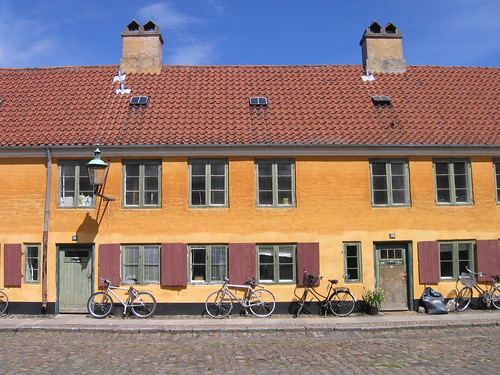One of the blogposts that has had most interest in this blog mentioned the inauspicious start I had with applying for Danish lessons at the kommune. Inauspicious or not, I did manage to start learning Danish in January 2012. However, having been to Danish lessons for three years on and off, I must admit that it has only served for me to become more and more disillusioned with the whole process.
Let’s Start with the School
In Sønderborg the kommune pays for foreign students to learn Danish at Lærdansk Sonderborg. Essentially, this means that the school has a monopoly in the area. In practice, this means that the school will get money from the kommune regardless of the quality of the teaching, so there seems to be no benefit in investing in improvements. And when I talk about improvements, I am not referring to smart boards and the like, but improvements in the actual quality of teaching.
Quality of Teaching
Where do I start?
Probably one of the biggest downfalls is that there is no emphasis on the basics. People at very different levels are in the same class, all doing the exact same work. E.g. when I started Danish, there were people in my class who had started Danish 3 months earlier. This meant I never got the basics. And there were still people joining 3 months after I did. In fact, I never ever heard the alphabet in class! This lack of basics means that it is next to impossible to understand the more nuanced areas of the language.
This is combined with an education system where there is no progression between one lesson and the next. It is not a course programme that builds one lesson on the previous, such that you continuously build on previous knowledge. Instead, what you get is 10 minutes about nouns one day, and 10 minutes about nouns one month later. And you would have probably missed the first 10 minutes because you hadn’t yet been put in the class.
The Teachers
During my time at Lærdansk Sonderborg I have been with three different teachers. I can sum up these teachers in this way: One came to class completely unprepared (but made sure we had fun). One came slightly more prepared (but was palpably disinterested in most of the students). And the third printed a lot of papers to give out, but there was no obvious explanation as to what we were being given and why. Teachers playing on phones, leaving the room, or showing us films with very limited if any follow up discussions all happened on regular basis.
That said, I have heard of some very good teachers on the grapevine too. Unfortunately, these seem to be very much the exception rather than the rule and I have yet to come across one.
What did I Expect?
What I expected when I started classes is the following:
- I expected to learn something new every time I went to class. I expected this to be following some input from the teacher over and above being given a worksheet and being told to get on with it.
- I expected the teacher to come to class prepared with a clear plan to make sure that the students are slowly but surely building their knowledge of vocabulary, grammar and confidence in the language.
- I also expected homework that helped us consolidate what we had learnt in class, if we so wished. When I asked for this I was told “You don’t have time for it as you work”.
- I also expected students who were there primarily for the learning (although making friends is an added bonus). This was something that, overall, was true.
Of course, it could be that my learning style is completely unaligned with the Danish teaching style. However, by speaking to a lot of other foreigners, that doesn’t seem to be the case. Or you might say I am expecting too much. After all, the school is free so I should be thankful for whatever I am getting. However, it is not free. I am paying for it from my taxes. You are paying for it from your taxes.
My Danish teaching has not all been this uninspiring. The best (in an, admittedly, poor pool) was with a private teacher through work. It is, obviously, not completely comparable, but the things that really helped were that the teacher asked me where I felt that I needed help, and listened to me by setting clear goals, and an emphasis on ensuring that I had understood what I had done by setting consolidation work. This rarely (if ever) happened in Danish classes at Lærdansk Sonderborg. No questions (or apparent interest) in where we needed help, and a topic was only tackled in one individual task rather than in a more holistic way.
Where am I now?
After 3 years of being in the system, spending most of the time not actually attending lessons, I have now passed my Prøve i Dansk 3 exam in November/December. This is the exam taken at the end of the course that shows proficiency in Danish to a B2 level according to the Common European Language Framework. You might, therefore, say that I reached my aim. However, I would say most of what I learned I learnt from a private teacher, my work colleagues, and from the Netdansk online teaching system, rather than the teaching actually at the Sonderborg Laerdansk school.
A version of this blog post was sent to the school around the time I decided to stop attending classes, with clear information that I was happy and willing to discuss my issues with them in order to make things better. Unfortunately I never received a reply besides that it would be forwarded on within the school.




